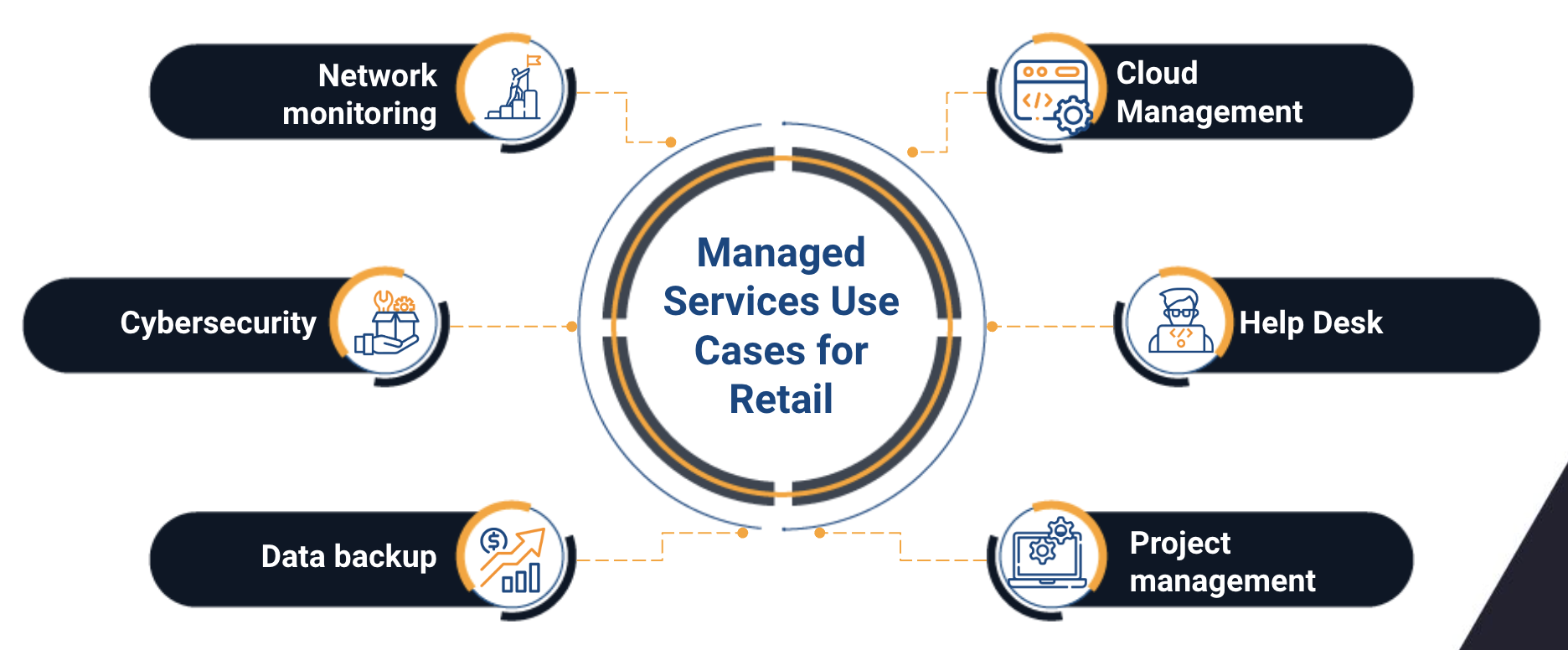
The retail industry faces unique challenges related to technology, data management, security, and operational efficiency. Managed services have emerged as a key solution to help retailers address these issues by delegating the management and optimization of their technology infrastructure. Below, we explore the key use cases, benefits, and the problems these services solve in the retail sector.

What are managed services and why are they important for retail?
Managed services are technological solutions offered by specialized third parties, which provide ongoing support and maintenance of companies' IT infrastructures. In the retail sector, managed services allow companies to improve their daily operations, increase security, reduce costs and focus on their core business.
1. Network management and monitoring: Ongoing maintenance and failure prevention
Network management and monitoring services are critical in retail, where business continuity is key to maintaining good customer service. A Managed service provider monitor local area network (LAN) and wide area network (WAN) installations, which is essential to avoid service interruptions and ensure that customer and transaction data are always available.
Benefits:
- Minimization of downtime, which is critical in retail.
- Prevention of network outages that can impact customer service.
- Proactive support that resolves issues before they impact operations.
Problem solved: Network outages that can harm customer experience and decrease sales.
2. Cybersecurity services: Threat protection and compliance
Cybersecurity is a priority in retail, as customers' personal and financial data are a frequent target of cyberattacks. Managed service provider implement firewall systems, malware protection, security audits, and threat detection, strengthening security and ensuring compliance with regulations.
Benefits:
- Protection of sensitive and financial data.
- Reduced risk of attacks and data breaches.
- Compliance with security regulations, such as PCI DSS for credit card transactions.
Problem solved: Prevents cyberattacks and data theft that could damage brand reputation and result in legal penalties.
3. Data backup and disaster recovery: protection against information loss
Managed services are also responsible for implementing data backup and recovery strategies to ensure the integrity and availability of information. In retail, where large amounts of customer, product and transaction data are handled, this service is crucial to avoid information loss in the event of system failures or cyberattacks.
Benefits:
- Regular data backup, minimizing the risk of information loss.
- Rapid recovery from incidents, ensuring business continuity.
- Improved customer confidence by protecting their data.
Problem solved: Loss of critical data, such as sales or inventory information, which can impact service and decision making.
4. Cloud Management: Flexibility and scalability
Cloud service management allows retail companies to store large volumes of data, access applications, and offer online services without the need for complex physical infrastructure. Managed service providers help manage storage, backup, and administration of virtual servers, making it easier to access information and improving the online shopping experience.
Benefits:
- Access to data and systems from anywhere, promoting mobility and flexibility.
- Reduction in costs associated with physical infrastructure and maintenance.
- Scalability to adjust to peaks in demand, such as Black Friday or high-volume sales events.
Problem it solves: Difficulties in managing large amounts of data and adapting to fluctuations in demand.

5. Helpdesk support: quick resolution to technical problems
Technical support or helpdesk is essential to resolve technical problems that may arise in points of sale, e-commerce platforms and other technological areas of retail. Managed service providers offer 24/7 assistance to solve problems quickly and efficiently, preventing failures from affecting sales or customer service.
Benefits:
- Fast resolution of technical problems to reduce downtime.
- Improved customer experience thanks to fast problem resolution.
- Constant availability of support, even during non-business hours.
Problem solved: Minimizes the impact of technical problems on sales operations and customer experience.
6. User account management: security in access to systems
Access and user management allows managed IT services to control who can access business systems and applications. This includes creating and deleting accounts, setting access levels, and monitoring user credentials. This service is essential in retail, where multiple employees need secure access to different levels of information and tools.
Benefits:
- Access and permission control to protect critical information.
- Prevention of unauthorized access that could put company data at risk.
- Centralized user management, saving time and resources.
Problem it solves: Prevents unauthorized access and possible information leaks.

7. Supply Chain Management: Optimizing product flow
Supply chain management is a key use case for retail, as it enables the coordination of raw material procurement, production, and product distribution. Managed service providers help optimize logistics and streamline product flow, allowing retailers to meet customer expectations in terms of availability and delivery times.
Benefits:
- Improved supply chain planning and efficiency.
- Reduced delivery times and inventory optimization.
- Improved customer satisfaction by ensuring product availability.
Problem solved: Inefficiencies in the supply chain that can cause delays and inventory shortages.
8. Consulting and Project Management: Technology Strategy and Execution
Managed service providers offer consulting and project management to help retail companies effectively plan and execute technology strategies. This includes advice on choosing new technologies, regulatory compliance, and optimizing operational processes.
Benefits:
- Access to expertise in planning and executing technology projects.
- Improved operational efficiency through customized technology strategies.
- Compliance with industry regulations and practices.
Problem solved: Lack of strategic direction in technology, which can lead to inefficient decisions or regulatory noncompliance.
Managed services for the retail industry represent a comprehensive solution to operational, technological, and security challenges. By outsourcing network management, cybersecurity, data backup, helpdesk support, cloud management, and other critical services, retail companies can reduce costs, improve efficiency, and focus their efforts on providing an excellent shopping experience.

